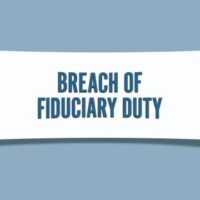Breach of Fiduciary Duty in Probate

When a loved one passes away, a family member typically needs to step in to act as the executor or administrator of the deceased’s estate. This person holds what’s called a fiduciary duty, which is a significant responsibility. It’s a legal obligation to act in the best interests of the estate and its beneficiaries. But what happens if that duty is broken? That’s where a breach of fiduciary duty in probate comes into play.
Fiduciary duty requires an executor (or administrator, if no will exists) to manage the estate with honesty, fairness, and care. This means protecting estate assets, paying debts and taxes, and distributing inheritances according to the will or state law.
What Is a Breach of Fiduciary Duty?
A breach occurs when the executor fails to meet these obligations and acts in a way that harms the estate or its beneficiaries. This can be intentional misconduct or simple negligence.
Common examples of a a breach of fiduciary duty in probate include the following:
- Mismanaging estate assets (poor investments, failing to safeguard property)
- Self-dealing (using estate funds or property for personal gain)
- Failure to distribute assets properly
- Ignoring debts or taxes owed by the estate
- Lack of transparency (not providing required accountings to beneficiaries)
Consequences of a Breach
If a fiduciary fails in their duty, they can face consequences. The probate court can do the following:
- Remove the executor or administrator
- Order restitution for financial losses
- Impose personal liability for damages caused by misconduct
FAQs About Breach of Fiduciary Duty
Q: Who can challenge an executor for breach of fiduciary duty?
A: Typically, beneficiaries and heirs of the estate have the right to petition the probate court if they suspect misconduct.
Q: How do I prove a breach of fiduciary duty?
A: Evidence such as financial records, missing assets, or failure to provide accountings may be presented to the court. Expert testimony (e.g., accountants) is sometimes used.
Q: What should I do if I suspect a breach?
A: Consult a probate attorney immediately. They can file a petition with the court to demand an accounting, investigate the executor’s actions, and request remedies.
Q: Can an executor go to jail for breach of fiduciary duty?
A: While most breaches result in civil liability, criminal charges can apply if fraud, theft, or embezzlement is involved.
Q: How can executors avoid breaching their duty?
A: Executors should maintain clear records, act transparently, seek professional help when needed, and always put the estate’s best interests first.
Seek Legal Help
Executors hold a powerful position, but with that power comes strict responsibility. If a fiduciary breach occurs, beneficiaries have legal recourse to protect the estate and hold the executor accountable.
Dealing with an estate can be difficult while grieving a loved one at the same time. Fort Lauderdale probate litigation lawyer Edward J. Jennings, P.A can provide you with the help you need with your Florida probate during this difficult time. To schedule a consultation with our office, call 954-764-4330 or fill out the online form.
Source:
reminger.com/media/publication/15178_PLJO_v35is3_DeMooy.pdf

